Religion
Hell Up To Date
A modern (1894) version of THE INFERNO. Many more weird illustrations at the link, where you may read the whole thing.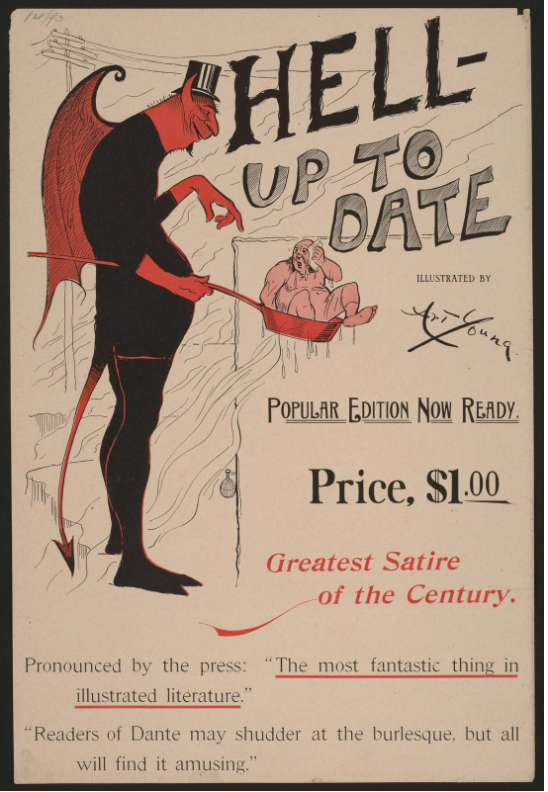
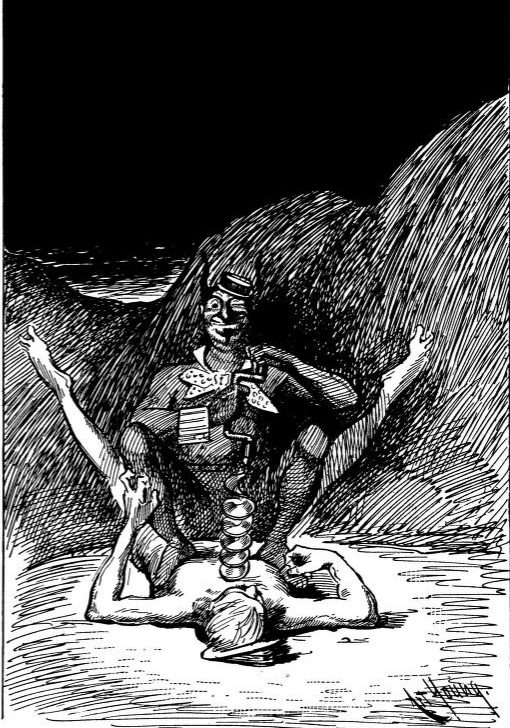
Posted By: Paul - Sun Aug 22, 2021 -
Comments (1)
Category: Fate, Predetermination and Inevitability, Literature, Religion, Parody, Satire, Nineteenth Century
Effective Emulation
A simple, psychological trick maximizes church giving:the evangelist knew that no person with money to give would be content with an "Amen" when a neighbor, sitting in the next pew, was acclaimed with a "Glory hallelujah!"
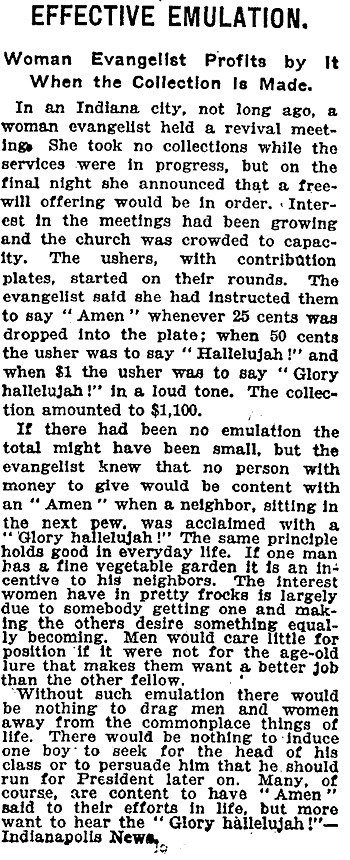
New York Times - May 18, 1919
Posted By: Alex - Wed Aug 18, 2021 -
Comments (3)
Category: Money, Religion, Psychology
The Power of Prayer on Plants
According to the Rev. Franklin Loehr, prayer could supercharge the growth of plants. Pretty much any prayer would work. He detailed his argument in his 1959 book The Power of Prayer on Plants.When Richard Nixon was told of Loehr's results, he reportedly said, "That sounds like a good kind of thinking to me."
However, in 1961, a group of Harvard students tried to replicate Loehr's results and failed to do so. In fact, in their experiment the plants that weren't prayed for at all grew better than plants that were prayed for by either skeptics or believers.
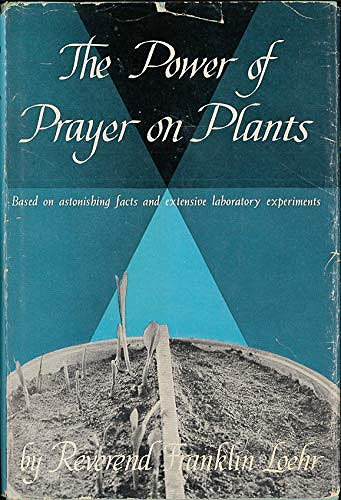
More details from Newsweek (Apr 13, 1959):
Can prayer make plants grow faster and bigger? Skeptics think it laughable, scientists find it irrelevant, and farmers tend to rely on more mundane methods to increase their crops. But the Rev. Franklin Loehr is convinced that the answer is yes, and has just written a book, "The Power of Prayer on Plants," to tell why.
After five years and 900 experiments, the 46-year-old Presbyterian minister reports he and 150 members of his prayer group found that prayed-for wheat and corn seeds grew into bigger seedlings than ones which got no prayer or outright negative prayer. Commenting on their methods last week in his Los Angeles home, Mr. Loehr explained that they used every kin of prayer and found every one effective to a degree.
"There were silent and spoken prayers," he continued, "those to loved ones, and the humble prayer straight to God. But mostly people just talked to the plants, loved them, or scolded them. First I tried buddying up to them, and then I observed that the people getting better results were approaching the plants on their own level of consciousness."
Picking up a copy of the book, he pointed to the jacket, which shows a lone, stunted shoot on the no-prayer side of an experimental seedbed. "He wasn't supposed to be there," explained Mr. Loehr, "so we blighted him with three bursts of negative command."
Mr. Loehr dropped the experiments two years ago, having persuaded himself, at least, of their validity. He is now concentrating on "soul dynamics" prayer for people—not, of course, to make them grow faster and bigger. "The fact is," he concluded, "we used plants to test prayer just as the artificial heart is tested in dogs instead of humans."
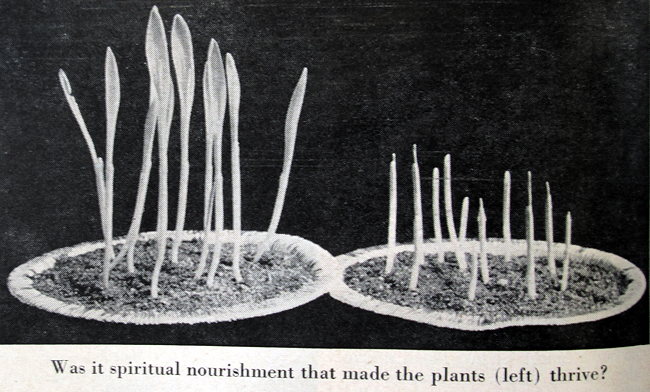
Along similar lines, see our previous post "Does holy water help radishes grow better?"
Posted By: Alex - Fri Aug 06, 2021 -
Comments (2)
Category: Religion, Experiments, Books, 1950s
The Fellowship for Human Happiness
1977: New York Attorney General Lous Lefkowitz ruled that "The Fellowship for Human Happiness" could no longer claim to be a church. It was instead, he decided, a house of prostitution masquerading as a church.Is there actually a rigorous legal test for determining what counts as a religion versus what doesn't? Or do judges (and Attorney Generals) just make determinations based on whether something feels appropriately religious to them? Google, so far, hasn't been able to supply me with an answer.

Tallahassee Democrat - Feb 10, 1977
Posted By: Alex - Wed Aug 04, 2021 -
Comments (10)
Category: Religion, 1970s
A Dummy Goes to Africa
Unfortunately, the book is not digitized, and original copies go for big bucks. But you can see more pics and read an account of the tale at the link.
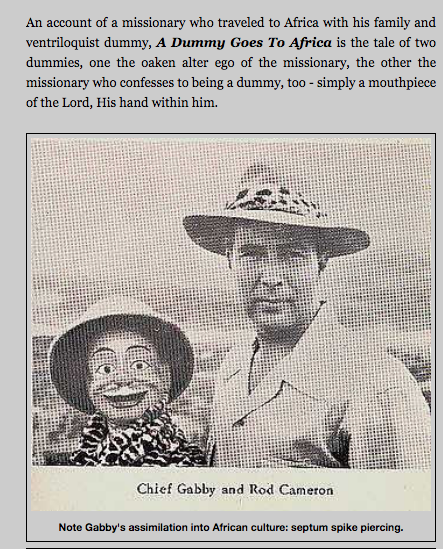
Posted By: Paul - Wed Jul 21, 2021 -
Comments (0)
Category: Puppets and Automatons, Religion, Books, 1960s, Africa
The Resurrection of Gladys Rogers
When 80-year-old Gladys Rogers died of flu in 1978, her evangelist son decided that he would freeze her body and then bring her back to life with prayer. Her resurrection, he believed, would turn people to Christianity. She lay in an upright freezer as he prayed.
St. Joseph Gazette - Mar 13, 1978
He prayed for two months before conceding that he had failed. He attributed his failure to a lack of faith. "It had nothing to do with the power of the Lord," he said. "The main thing was I can't bring mama back, but I'll meet her again in Heaven."
More info: Springfield News-Leader

Miami Herald - Apr 1, 1978
Posted By: Alex - Fri Jul 09, 2021 -
Comments (2)
Category: Death, Religion, 1970s
Self-castration in early Christianity
Some ancient weirdness: The First Council of Nicaea, in 325 AD, was a meeting of Christian bishops in which they tried to establish the rules and doctrines that all Christians were supposed to follow. Wikipedia says:However, one of the lesser-known rules that the bishops enacted at the Council was to ban men who had castrated themselves from being in the clergy. Because, apparently, self-castration had become something of a fad among early Christians. Enough so that the bishops felt the need to put an official stop to the practice.
The historian Daniel Caner has examined this issue in his 1997 article "The practice and prohibition of self-castration in early Christianity".
Caner notes that the fad had its origin in a passage from the New Testament, Matthew 19:12, in which Jesus appears to endorse the practice of self-castration. As the passage reads in the King James translation:
Most interpreters of the Bible, ancient and modern, argue that when Jesus used the word 'eunuch' he meant it as a synonym for 'celibacy'. Apparently this was a common use of the term 'eunuch' in the ancient world.
Nevertheless, he used the term eunuch. So some early Christians decided the passage should be taken literally. In which case, Jesus seemed to be saying that, while self-castration was not appropriate for all men, for an elite few it was an ideal to strive for. Inspired by this passage, a number of men "took the sickle and cut off [their] private parts."
The most prominent Church father who was said to have castrated himself was Origen of Alexandria (c. 185 - c. 253). But Caner notes that there was an entire sect of early Christians, the Valesians, who embraced the practice. Wikipedia says that, in addition to castrating themselves, "They were notorious for forcibly castrating travelers whom they encountered and guests who visited them."
According to Caner, the more widely adopted Christianity became in the Roman empire, the more the Church tried to present itself as the upholder of mainstream values, and self-castration really didn't fit into that image. Therefore, "Radical manifestations of an ideal de-sexualization... became a 'heretical' threat to the orthodox community."
Posted By: Alex - Fri Jul 02, 2021 -
Comments (5)
Category: Body Modifications, Fads, Religion, Ancient Times, Genitals
Banana Ganesh
Read all about it here.
Posted By: Paul - Mon May 24, 2021 -
Comments (3)
Category: Animals, Art, Statues and Monuments, Food, Religion, Bananas
The Sacred Chickens of Rome
Strange custom: The ancient Romans were reportedly loath to embark on any major undertaking, particularly battles, before they had consulted sacred chickens. As told by HistoryCollection.com:
Publius Claudius Pulcher And The Sacred Chickens
However, the advice of the sacred chickens wasn't always followed. As told by the Anecdotes from Antiquity blog:
Posted By: Alex - Wed May 05, 2021 -
Comments (4)
Category: Animals, Customs, Religion
Dannie Druehyld, Only Official Witch of Denmark, Has Passed
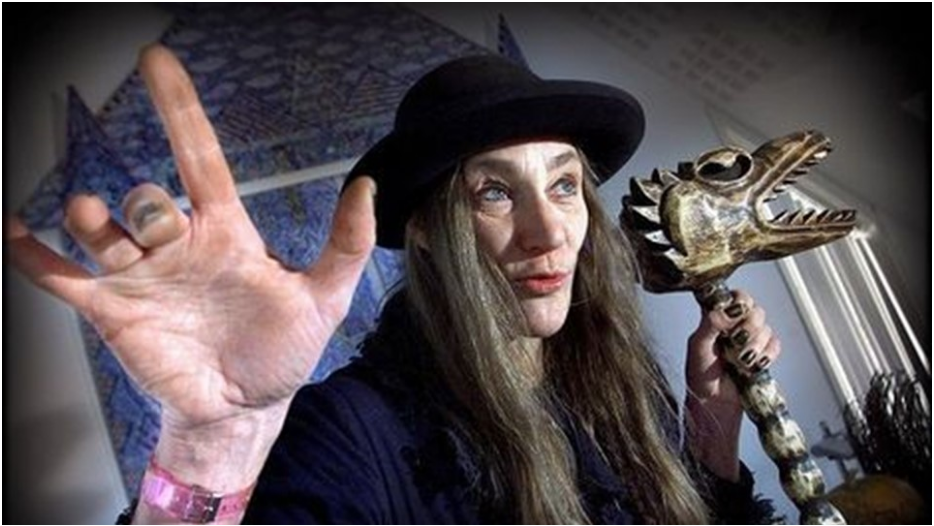
Some interesting videos, not in English, at the obituary.
Dannie Druehyld knew every single plant and stone in Rold Skov, after calling the forest [her] home for more than 30 years. Now Denmark has lost its only officially registered witch. Dannie Druehyld died on Monday, aged 74. She leaves behind a daughter and a granddaughter.
According to Dannie Druehyld, she was a witch before she was born, and in Rold Skov she has over the years taught children and adults about the forest's magic, folk beliefs and ancient wisdom through her workshop in the Rebild Center. She has also published several books, including "The Witch's Handbook", which tells about witch life all year round.
Posted By: Paul - Wed May 05, 2021 -
Comments (0)
Category: Eccentrics, New Age, Religion, Rituals and Superstitions, Supernatural, Occult, Paranormal, Europe

| Who We Are |
|---|
| Alex Boese Alex is the creator and curator of the Museum of Hoaxes. He's also the author of various weird, non-fiction, science-themed books such as Elephants on Acid and Psychedelic Apes. Paul Di Filippo Paul has been paid to put weird ideas into fictional form for over thirty years, in his career as a noted science fiction writer. He has recently begun blogging on many curious topics with three fellow writers at The Inferior 4+1. Contact Us |




